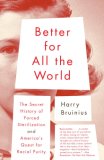Summary | Excerpt | Reviews | Beyond the Book | Readalikes | Genres & Themes | Author Bio
The Secret History of Forced Sterilization and America's Quest for Racial Purity

Critics' Opinion:
Readers' Opinion:
First Published:
Feb 2006, 416 pages
Paperback:
Apr 2007, 416 pages
 Book Reviewed by:
Book Reviewed by:
BookBrowse Review Team
Buy This Book
These fears were not simply his own. Many of the world's leaders, Dr.
Bell knew, felt the same. Former president Theodore Roosevelt had called
this trend "race suicide," and had felt that America's greatness was
being threatened not only by rampant poverty but also its cozy
affluence. He had once proclaimed, "Some day we will realize that the
prime duty, the inescapable duty, of the good citizen of the right type
is to leave his or her blood behind him in the world; and that we have
no business to permit the perpetuation of citizens of the wrong type."
The inventor Alexander Graham Bell, the social crusader Margaret Sanger,
and the administrators of the Harriman, Carnegie, and Rockefeller
philanthropic foundations were each calling for state-sanctioned
programs of better breeding. The editorial pages of newspapers such as
the New York Times, scholars at Harvard, Yale, and Stanford, as well as
professional associations of doctors and social workers were each urging
the nation's legislatures to quell the tide of "hereditary defectives."
In addition, many British leaders supported compulsory sterilization to
purify their nation's genetic pool. When Winston Churchill was home
secretary, he had once written to Prime Minister Herbert Asquith urging
support for a sterilization bill before Parliament. "The unnatural and
increasingly rapid growth of the feeble-minded and insane classes,
coupled as it is with a steady restriction among all the thrifty,
energetic and superior stocks, constitutes a national and race danger
which it is impossible to exaggerate," he explained. "I feel that the
source from which all the streams of madness is fed should be cut off
and sealed up before the year has passed. . . . [A] simple surgical
operation would allow these individuals to live in the world without
causing much inconvenience to others."
Now, after nearly twenty years of effort, the case of Carrie Buck
provided the most resounding legal affirmation of this theory of genetic
engineering. In the Supreme Court case that bore Bell's name, Justice
Oliver Wendell Holmes, Jr., feared the United States would be "swamped
with incompetence" if women like Carrie continued to have children. "It
is better for all the world," he wrote in the majority decision of Buck
v. Bell, "if instead of waiting to execute degenerate offspring for
crime, or to let them starve for their imbecility, society can prevent
those who are manifestly unfit from continuing their kind. . . . Three
generations of imbeciles are enough."
Yes, our descendants may well be proud. Actually, this idea wasn't new
at all, Dr. Bell would muse. "Racial improvement" was a practice as old
as the first great civilizations of the world. Didn't remarkably heroic
races cast their defective infants in the River Tiber or leave them upon
the mountainside to starve? "The idea of elimination, by one way or
another, of those who were expected to be disqualified for a certain
standard of physical and mental perfection, has come down to us through
a great space of time," he would later maintain. "And it persists as
strongly in the minds of people today as it did in the minds of the
ancient Spartans and Romans. . . . Such efforts to preserve a healthy
race, cruel as they may seem, were after all but the pursuit of natural
laws: the buds unfit to mature, fall; and the weaklings of the flock
must perish."
Excerpted from Better for All the World by Harry Bruinius Copyright © 2006 by Harry Bruinius. Excerpted by permission of Knopf, a division of Random House, Inc. All rights reserved. No part of this excerpt may be reproduced or reprinted without permission in writing from the publisher.





The Flower Sisters
by Michelle Collins Anderson
From the new Fannie Flagg of the Ozarks, a richly-woven story of family, forgiveness, and reinvention.

The House on Biscayne Bay
by Chanel Cleeton
As death stalks a gothic mansion in Miami, the lives of two women intertwine as the past and present collide.

The Funeral Cryer by Wenyan Lu
Debut novelist Wenyan Lu brings us this witty yet profound story about one woman's midlife reawakening in contemporary rural China.
Your guide toexceptional books
BookBrowse seeks out and recommends the best in contemporary fiction and nonfiction—books that not only engage and entertain but also deepen our understanding of ourselves and the world around us.